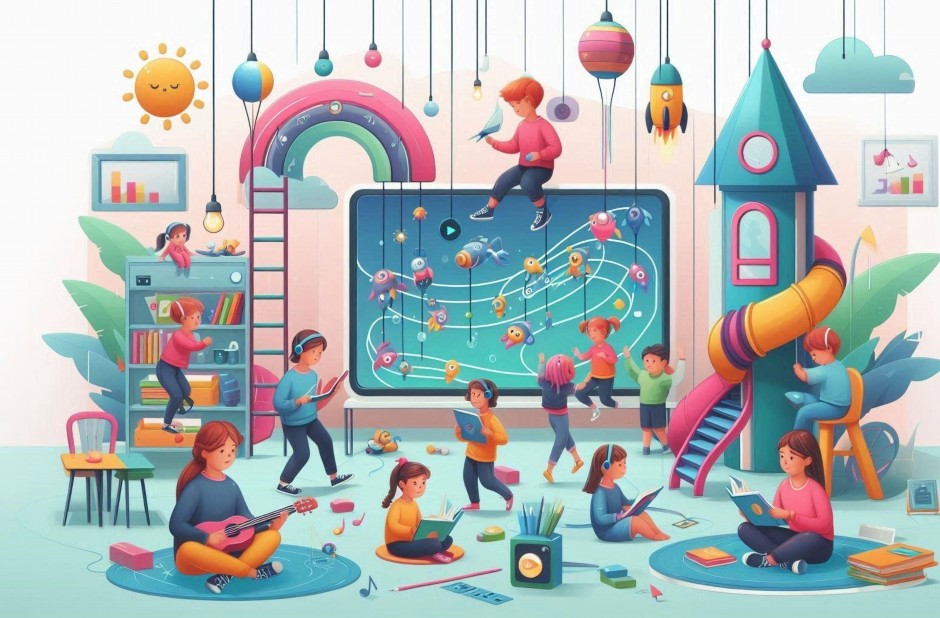In recent years, there has been a significant advancement in the field of Artificial Intelligence (AI) and Augmented Reality (AR). These technologies have become increasingly popular and have the potential to enhance virtual experiences in various fields such as gaming, education, healthcare, and...
New Program Helps Children Learn While Playing

Educational experts have long recognized that children learn best when they're engaged and having fun. A groundbreaking new program is now putting this principle into practice, revolutionizing how young learners acquire essential skills through play-based activities that feel more like games than traditional lessons.
The Science Behind Play-Based Learning
Research consistently shows that play is not just entertainment for children—it's a fundamental way they explore, understand, and interact with the world around them. When children engage in play, their brains are actively forming neural connections that support cognitive development, problem-solving skills, and creative thinking.
The new program leverages this natural learning process by integrating educational content into carefully designed play experiences. Rather than forcing children to sit still and memorize facts, the approach allows them to discover concepts through hands-on exploration and interactive challenges.
Key Features of the Program
Interactive Digital Platforms
The program utilizes cutting-edge technology to create immersive learning environments. Children navigate through virtual worlds where they solve puzzles, complete quests, and interact with animated characters—all while practicing math, reading, science, and social skills.
Physical Activity Integration
Recognizing that children need to move to learn effectively, the program incorporates physical activities that reinforce academic concepts. Students might:
- Jump on number sequences to practice math facts
- Act out story characters to improve reading comprehension
- Build structures to understand engineering principles
- Participate in team challenges that develop collaboration skills
Personalized Learning Paths
Each child's progress is tracked through sophisticated algorithms that adapt the difficulty and content based on individual strengths and areas for improvement. This ensures that every student remains challenged without becoming frustrated or bored.

Benefits for Students and Educators
Enhanced Engagement
Traditional classroom settings often struggle to maintain children's attention for extended periods. The play-based approach naturally captures and sustains interest, leading to longer periods of focused learning and better retention of information.
Improved Social Skills
Many activities within the program require collaboration, communication, and teamwork. Children develop crucial social and emotional skills while working together to solve problems and achieve common goals.
Reduced Learning Anxiety
By removing the pressure associated with traditional testing and evaluation methods, children feel more comfortable taking risks, making mistakes, and learning from failures—essential components of the learning process.
Real-World Results
Schools that have implemented the program report significant improvements in student performance across multiple subjects. Teachers note increased participation, better behavior, and more positive attitudes toward learning among their students.
Parents have also observed changes at home, with children showing greater enthusiasm for educational activities and demonstrating improved problem-solving skills in everyday situations.
Academic Achievement
Standardized test scores in participating schools have shown measurable improvements, particularly in areas such as:
- Mathematical reasoning and computation
- Reading comprehension and vocabulary development
- Scientific inquiry and critical thinking
- Creative expression and communication
Looking Forward
As more educators recognize the effectiveness of play-based learning, programs like this are likely to become increasingly common in schools worldwide. The success of this innovative approach demonstrates that learning doesn't have to be a chore—it can be an adventure that children eagerly anticipate each day.
The program represents a significant shift in educational philosophy, moving away from one-size-fits-all instruction toward personalized, engaging experiences that honor how children naturally learn and grow. As technology continues to evolve, we can expect even more sophisticated and effective play-based learning tools to emerge, further transforming education for future generations.



